Notion is the company with the most radical AI strategy in the field of productivity tools: 2 months after the launch of ChatGPT, Notion announced the launch of Notion AI, which directly integrates the GenAI experience into the product and presets prompts according to different needs and scenarios. Users only need A space or “/” is required to invoke GPT.
One month after Notion AI went online, there was news that Notion AI brought $10 million in ARR to Notion. Two months after Notion AI went online, the number of Notion AI users exceeded 4 million. In addition to continuously improving the Q&A interaction experience, Notion has also launched new features and products such as Notion Project, Notion Q&A and Notion Calendar.
In the interview, Ivan shared Notion’s thoughts on AI practice: how the team’s all-in AI decisions are made, why RAG and workflow agents are underestimated by the outside world, and the language model will bring the SaaS world to a certain extent. Entering a new round of bundling cycle .
Notion’s vision is to build a variety of “building blocks” to allow users to build more personalized and customized applications that meet actual needs on the platform, thereby realizing that “everyone can make their own software” Ivan believes that the emergence of language model will definitely accelerate this process. Furthermore, RAG will also completely revolutionize the form of knowledge-based work and team communication. New functions and products such as Notion Project, Notion Q&A and Notion Calendar serve exactly this.
01、AI is an opportunity for Notion
Sarah Guo: How would you define Notion?
Ivan Zhao : Notion is difficult to define because it can be used to do many things, but we also hope to create an all-round tool that users can use to complete most tasks in daily life. For example, individual users can use Notion It can be used to take notes, travel planning, wedding planning, etc. Enterprise users can also use Notion to complete document management, task tracking, and internal knowledge base construction using just one tool. The reason why we want to do this is because there are a lot of SaaS software tools on the market and the market is quite fragmented, but maybe for users it would be a good thing if a product allows them to do most of their work all-in-one. .
The way Notion achieves this goal is not to cram many functions into a specific product, but to build lower-level blocks. Users can use these blocks to creatively make various perfectly matching products just like building Lego blocks. Use cases for individual or team needs.
In fact, what Notion is doing is not new , because people have discussed using block logic to build software in the 1980s and even the 1970s. Today, we are only achieving this with the support of cloud and AI, breaking the limitations of the past software that was oriented to specific functions.
Sarah Guo: It is true that we have been in an overly fragmented SaaS world for the past 20 years. In theory, making a universal tool should be a natural trend, but why is no one doing it?
Ivan Zhao : In fact, people have tried it from many angles. For example, the recently popular No-code thinks about this from the perspective of individual developers. No-code allows everyone to modify the software tools they use every day. Language model provides another perspective, that is, the management of underlying knowledge and data needs to be unified. The big picture is also a perspective, because if you consider the budget, it is obviously more cost-effective to pay only one vendor than to pay for 5 SaaS software.
I think Notion thinks about this more from a calculation, content or text-related perspective. For example, all of us can read and write, but for most people, the computer is just a typewriter or a tool for watching YouTube, and it is not creative in itself. Maybe things would be different if more people were able to use their software more creatively. The value provided by the people who create software and the people who use it are completely different, which is an important reason why rent in San Francisco is so expensive.
Pioneers in the computer field have discussed this matter a long time ago. They believed that controlling computers would one day be as popular as literacy. However, they may not have thought at that time that AI would become an interesting variable. Language models can not only create software, It can also help people complete a lot of thinking-related work. What happens next will be quite interesting.
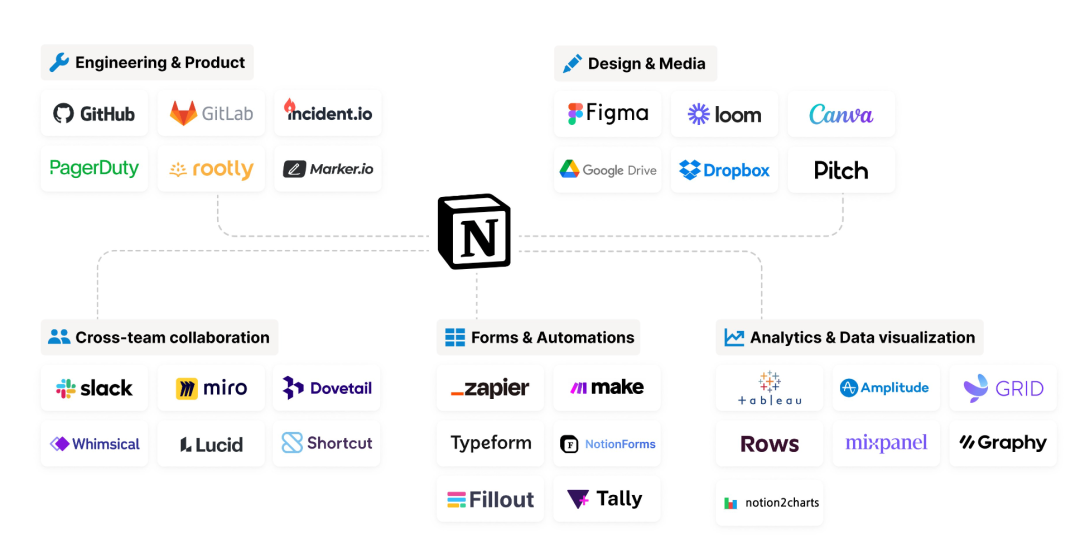
Sarah Guo: You often mentioned that Notion is not only a productivity tool, but also an application building platform. How did you come up with this idea? Why do you think people want to build more apps?
Ivan Zhao : I don’t think people want to build more applications .
Notion was born from a paper I read in college, Douglas Engelbart’s Augmenting Human Intellect: A Conceptual Framework. Today, when people use software, they usually use a specific product for a specific task. But when computers first appeared, such as in the 1960s, 1970s, and 1980s, the way people used computers was more flexible, and we could enter the system level. Make adjustments, modify or tweak the operating system in real time, even while it’s running. This incident inspired me a lot.
Today, the way people use computers and interact with software sometimes seems rigid. So can we create a new kind of software that allows people to flexibly adjust and customize it? This is our original intention when we founded Notion. We are actually re-examining the issues discussed by the pioneers in the computer field.
You just mentioned that most people don’t want to create software, they just want to complete the tasks assigned by their boss. Therefore, the experience we learned during the creation of Notion and the resulting change is that instead of providing a tool for building software, a better way is to provide users with various templates built with blocks, so that Users can get started immediately.
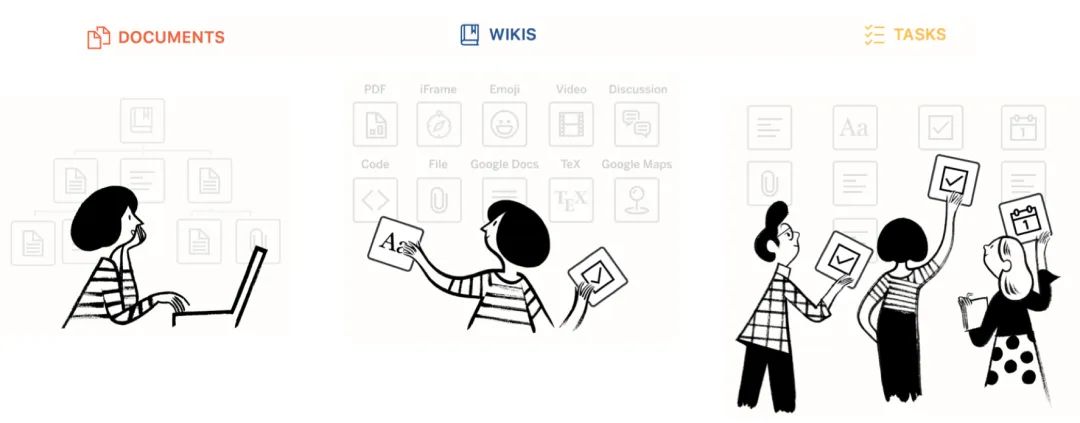
Elad Gil: What impact does AI have on this goal?
Ivan Zhao : I think Notion is very lucky. We don’t actually focus on building a specific use case. Our focus has always been on the Lego building blocks for building these use cases. Among these “building blocks” are document editing. The most basic “building blocks” of the class, we also introduced a relational database. Tables, comments, different access rights, etc. are also very important “building blocks”. We’ve been building these building blocks for the past five years.
AI is more like a new engine that combines and drives these building blocks in new ways. It is precisely because we have been building and improving these building blocks that we can quickly combine AI with existing functions. The reason why we are one of the large-scale AI collaboration software on the market is because we have spent many years on text editors, and because we have already built relational databases, we can combine AI and databases. , We were able to quickly launch Notion Q&A because of our investment in knowledge base products.
We can apply RAG to Notion’s products because we have made various “Lego building blocks”. AI is a particularly good opportunity for Notion, and we just seized this opportunity.
Elad Gil: Notion has built many core templates and use cases, such as project management tools, knowledge bases, etc. Among them, which functions do you think will be most affected by AI?
Ivan Zhao : I think RAG will completely change the way knowledge management is done and free people from the tedious work of organizing information. One of Notion’s most beloved features is the sidebar, which people use to organize their knowledge base and personal workspace. But in the future we may no longer need such tools to organize knowledge bases. Users simply drop information into Notion and it can be retrieved in a variety of ways. This is the future of knowledge management.
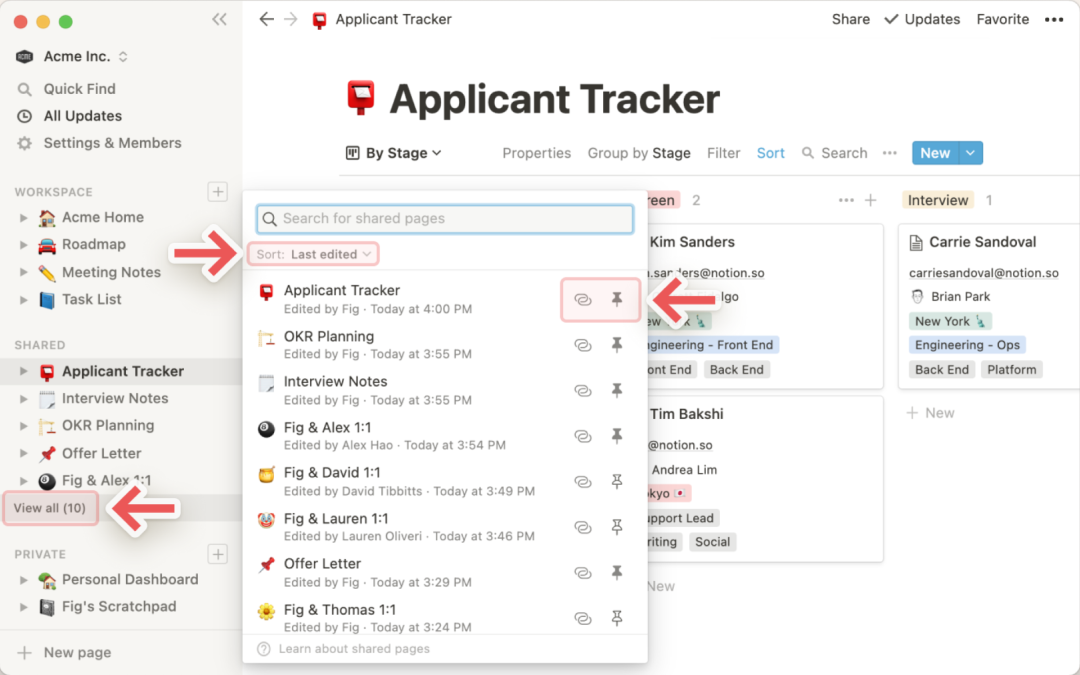
Sarah Guo: In the early days of the PC era, people would discuss what would be the biggest change brought about by PCs in 30 or 40 years? What are your expectations for the future development of AI today?
Ivan Zhao : For AGI, the time scale of 30 or 40 years may be a bit too long. We don’t even need to wait until the next 10 years. There will be significant breakthroughs in AI in the next 1-2 years. One area that I think is undervalued is RAG.
Today’s language model can already well understand what people input into the computer, which means that we no longer need to organize the information ourselves to facilitate future information retrieval. AI can do this better than any human being. All good.
Before the language model, we had to search for some content in the knowledge base, which usually required very precise keywords. Sometimes we even had to ask colleagues if they remembered a certain sequence or which database a certain information was stored in. But now you can directly ask Notion AI the question you want to search for, and AI will soon give you the answer. This is an application scenario that I am personally very excited about, and many people are also discussing it.
Another thing that I think is worth looking forward to is Work Agent. Many people have begun to pay attention to this field.
02、The birth of Notion AI
Sarah Guo: Notion AI is progressing very quickly, especially compared to many products that don’t yet know how to use AI. How did you make decisions and allocate resources during this process?
Ivan Zhao : Simon and I both have strong convictions about AI. When we went to OpenAI’s office in the early years, we didn’t understand what the company was doing at all, but at that time we had already seen the very early demo of GPT. .
I must admit that I underestimated GPT-3 when it first appeared. Although GPT-3 can already help people with marketing planning and first draft writing, I didn’t think it would be of much use. It wasn’t until I saw the capabilities of GPT-4 that my mind changed. I discovered GPT-4 You can already think and reason, you can complete a variety of things, and you can optimize your workflow in a more practical way. GPT-4 had a great impact on me. It gave me a lot of confidence, and I felt that this would be a huge turning point.
What is knowledge work? Why do people need software?
Fundamentally speaking, software is the information processing activity of all of us, just like a piece of paper is passed in front of you, a human changes a few words, and then pushes it to another person. To some extent, language models can already help us complete this information processing. So, I believe this will completely change the way we interact with computers.
After that, our team basically devoted itself to the AI project. We have a lot of building blocks in place, and the next step is to figure out which building blocks can be combined with AI and who within the company has deep knowledge of this technology. Although we have a search team, our ML team is not large, so we still need to recruit more talents, and at the same time, we also need to have people within the company share a common belief in this technology so that we can move towards Moving in the same direction. Like the dinosaurs facing an asteroid impact, we need to prepare for the coming changes.
Elad Gil: In order to make Notion an AI-first product, what work have you done at the team level?
Ivan Zhao : In the early days of Notion AI, we mainly relied on “strength to create miracles.” My co-founder Simon Last made a lot of contributions to this matter. He quickly learned a lot of AI-related things.
There are many people in the Notion team who are interested in interface and design, and there are also many full-stack talents on the front and back ends. We also have some people who specialize in search, but there are not many ML-related talents, or even none. Over the past year, we have been learning how to do AI.
Our various attempts at AI are very similar to the baking process: prepare all the raw materials, put them into the oven, and press the button. All that is left is to wait. No one can predict what the finished product will look like, so this requirement We have enough patience, and at the same time we have to make a lot of adjustments and preparations.
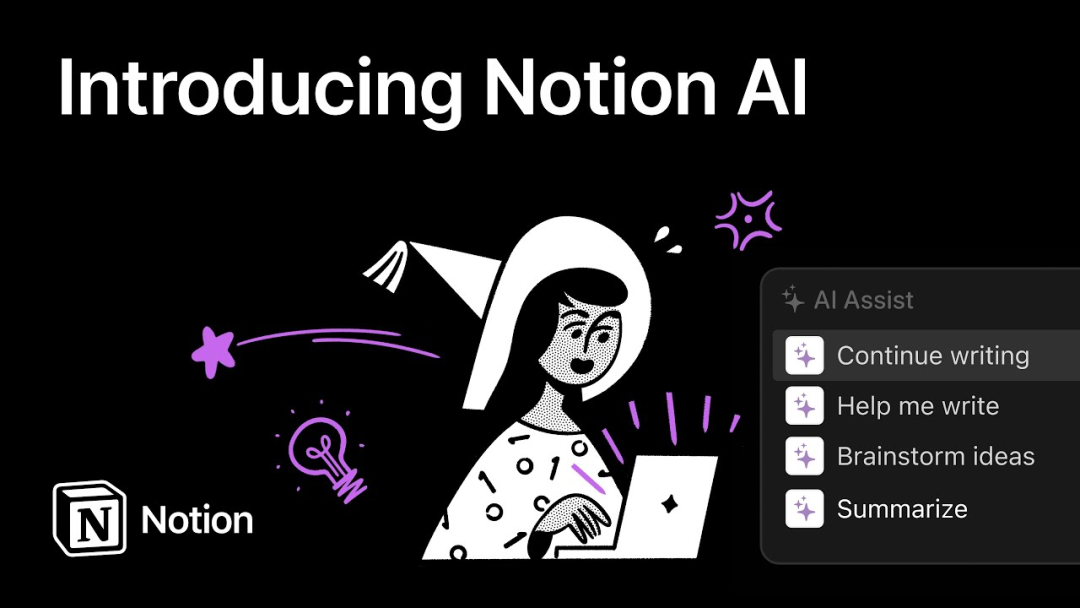
Elad Gil : Some people summarize this process as probabilistic engineering, which makes people feel that we have entered a field full of randomness, at least partially random.
Ivan Zhao : Yes, this type of work is very similar to gardening. I don’t know how to do this type of work myself, so I really need such a person to help me do this.
Another type of people Notion needs are people who are curious and quick to learn. Language model allows everyone to call AI capabilities in real time to complete their tasks, but there are actually many skills in how to make good use of model capabilities, and how to combine LLM with user interaction is also a very important issue. This kind of people are generally called AI engineers. Notion’s AI engineers are very young, many are not even 21 years old.
Both types of AI talents have strong work abilities. Notion currently does not have many AI researchers, and this type of talent is also very important in my opinion. But Notion is at the application layer after all, so we spend a lot of time studying how to use the model.
Elad Gil: From GPT-3 to today, we have seen that GPT capabilities have improved very quickly, and each generation of models will bring new business models. What work do you think needs to be done to fully utilize the capabilities of GPT?
Ivan Zhao : The essence of technology is trade off. Language model brings a new feature that is not available in software that has been programmed for specific functions in the past, but we don’t quite understand how it works completely, so people have been discussing on Twitter how to make it better. The ability to use models effectively.
For enterprises and entrepreneurs, they must make some trade-offs when facing new technologies. They must always understand the market’s evaluation of the capabilities of various new models. This industry is currently growing rapidly and changing.
On a technical level, models are now able to handle a wider range of contextual information, have stronger reasoning capabilities, run faster, and take up fewer resources. This is very important to Notion, because what we need is a cloud service like GPT-4 that is both smart and efficient. We need AI to help us perform complex reasoning tasks or quickly summarize text content, and preferably the cost is low enough and the speed is fast enough. This is where we need to focus on the technical side.
In addition to technical factors, I personally also pay attention to many changes in human behavioral habits, such as the behavioral inertia of individual users, the risk tolerance of companies, etc., and these are also slowly evolving. As Steve Jobs often said, ” You can’t make something too new. You have to keep most of the same and change one or two key points. “
Off White founder Virgil Abloh’s philosophy is that only 3% of change is needed, but it is enough to push the boundaries and make people accept new things.
The 3% approach (3 Percent Approach) is the design philosophy of Virgil Abloh, the founder and designer of the fashion brand Off White. The core idea of this concept is to make no more than 3% changes based on the existing design, so as to make it more fashionable. Products look familiar yet new. This approach allows designers to create new pieces by making subtle adjustments while respecting the original design. These changes may include slight changes in color, material, structure or other design elements.
The improvement of language model capabilities and the integration of language model and SaaS software should be carried out simultaneously, because if the change is too big all at once, people may not adapt to it. The advantage of RAG is that it can be used in existing interactions. It gives better output based on habits .
Elad Gil: You mentioned a balance between inference quality, speed and cost. How does Notion use models? Did you only use Llama or would you call different models in different scenarios?
Ivan Zhao : Different companies and products have different goals, and naturally the models they choose are also different. Notion will try various models, especially the most advanced open source models at the moment, but because Notion attaches great importance to reasoning capabilities, we generally use high-level models.
03、RAG: The future of knowledge management
Sarah Guo: Notion Q&A is not open to everyone yet. Can you tell us about Notion’s AI Q&A for those who haven’t experienced it yet?
Ivan Zhao : Essentially, Notion will help users remember everything they input into Notion. Not only Notion can do this, but most systems that give RAG can do this.
Before the emergence of language model and RAG, the reason why people needed computers was because they needed a place to store information, and they could retrieve and call this information at any time. However, retrieval mainly relied on keywords, and the words had to be quite precise, so sometimes Users will be required to have some skills in optimizing keywords. But with RAG, the language model can understand what you input.
Therefore, we do not need to organize and manage information specifically in Notion, because no matter what we enter, we can search it out smoothly. Regardless of whether it is an individual or a team or a company, RAG provides perfect memory capabilities. This is equivalent to having a perfect memory for an individual, company or team.
On top of this, if we design the product well enough, we can also push the right information to the corresponding members at the right time. Not only that, if we design it properly, we can also push the right information at the right time. To the right person. Perhaps more than 50% of knowledge work is this type of task.
Notion may be the first company on the market to provide RAG-related functions on a large scale, but it is difficult to provide RAG services on a large scale. Notion Q&A is still on the waiting list, and we are still improving it.
With RAG, the team search experience will be completely different. I myself have changed the way I use Notion. For example, I will ask “When will the company move to a new office?” If someone in the team has recorded this in a document, Notion will reply to me with the corresponding information, and I no longer need to ask other people like before.
Everyone in the team, whether designers, engineers or operations, also ask similar questions in Slack and emails every day. It may take 10 minutes to write an email to answer these questions, and 20 minutes before that to find the corresponding answer. If you include various waiting times, it may take more than half an hour, but with Noton Q&A, This type of problem only takes a few seconds to resolve. RAG has already helped us become more productive, and that’s just the beginning.
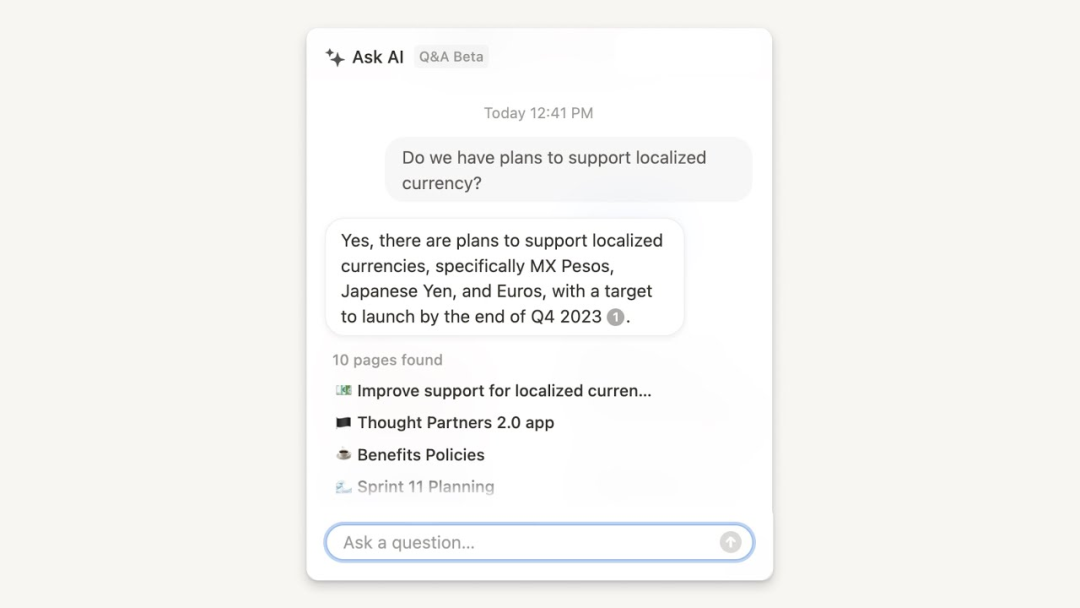
Elad Gil: There have been more and more discussions about Agent in recent times, but objectively speaking, because some capabilities cannot yet be realized, the value of Agent or automation-related applications has not yet been truly reflected. Notion also recently launched the Calendar app. I’m curious what you think of the combination of AI and schedule management?
Ivan Zhao : I would look at the capabilities of AI this way.
First of all, RAG and information retrieval are of the same type and are related to the knowledge category. The other category is related to workflow. We choose to use agent to define this matter. The reason why people need meetings and schedules is because we need to complete the “bit transmission” between each other’s brains. So can I use a language model to accomplish this? Maybe it can be achieved. The most basic link is that the moment people finalize a meeting time, their schedules also change accordingly. Many things we do involve time. Can the language model help us adjust the time schedule? I think it is ok.
Elad Gil: It sounds like being retrievable is also a key part of the whole process. It would be quite valuable to users if our calendar could automatically fill in all the information we need to know about a meeting, attendees, or other related matters. Where do you think Notion Calendar can create value?
Ivan Zhao : It can simplify our workflow. This is a major breakthrough and allows Agent to help us complete knowledge-based work.
The reason why we need to communicate is because some tasks cannot be completed automatically by software and require us to process them in real time. This may be a question worth thinking about. With the development of language models, will we communicate more or less in the future? My guess is less. Because Agent basically relies on language model, this is the future of communication.
Sarah Guo: You mentioned that Notion can help users organize and manage information like a brain. If a person’s brain itself is chaotic and lacks a system, will this affect the way he interacts with information in Notion or similar systems? Do users need to build their own knowledge base in a structured way first, or do they only need to input all information in the form of information flow?
Ivan Zhao : We may gradually no longer need information structuring or similar concepts. The reason why we need to organize and organize information is because it can only be retrieved if these tasks are done well. We also need index because index is like each item on the folder. This kind of tag can help us quickly find various files, but because of embedding and RAG, we only need to put all the information into this “document bag”, and then you can search and find the information you want in any way as needed. The freedom of information will be greatly improved.
We can also imagine a scenario where when I have a new idea, I just need to take a photo or write something down, and then put it into Notion. Notion will help us organize and manage this information . If we need it in the future When we use this knowledge, Notion, as a perfect memory assistant, will help us retrieve it. This is Notion’s long-term vision, and I personally find it very exciting.
04、AI brings SaaS into a new round of bundling
Sarah Guo: How do you think about Notion’s AI strategy? Are these strategies also inspired by the history of computer technology?
Ivan Zhao : Many of my intuitions are actually based on some understanding of history. History does not simply repeat itself, but there are always some similar patterns. I personally think that we are still in the bundling stage. The first chapter of “The Romance of the Three Kingdoms” mentioned that “If we divide for a long time, we must unite, and if we unite for a long time, we must divide.” I think the same is true for the operation of business. Before the bundling stage, the SaaS industry had actually gone through a stage of unbundling and service dispersion.
The trend of unbundling started in the mid-2000s. Before that, all products related to the information field needed to be completed based on Microsoft, which was a typical building stage.
In the early PC era, there were actually many various applications, such as early versions of “StarCraft”, various text editors, dBase database software, and other different database software. In the 1990s, because Microsoft provided an underlying operating system, we also entered a bundling stage. Subsequently, with the development of network technology, software began to run on the Web, which brought about the unbundling and fragmentation stage of the past 10 to 15 years ago. At the same time, lower capital costs lowered the threshold for entrepreneurship, and also This has led to excessive fragmentation of the information field.
Today, with the emergence and development of AI and language models, we seem to have returned to the bundling stage. Because the model essentially requires that information be concentrated in one place to achieve more efficient information processing.
Therefore, we are in the bundling stage today, both because of macroeconomic trends and because of the inherent need of the language model to integrate information and functions.
Sarah Guo : If we look closely at companies like Oracle that have been dominant in the past 15 years, we will find that they have a common strategy: acquiring the second-ranked product in the same field . Because it is difficult for customers to deploy these products individually, or they prefer to consolidate everything into a single database. I think this has some similarities to the language model you mentioned.
Ivan Zhao : Yes, this example from Oracel is great. I think there is both distribution-level bundling and information-level bundling. The Oracle mentioned earlier is more inclined to bundling from the sales perspective. Language model requires bundling of data and information.
Sarah Guo: When Notion first started, the first companies to use Notion to build knowledge bases were startups. Today, while Notion is growing in scale, the macro environment we are in has also changed, and startup budgets are tighter than before. What do you think about helping enterprises adopt AI for knowledge management?
Ivan Zhao : We are still in the early stages and have not yet fully achieved the scale of users.
In my opinion, bundling has many benefits. First, it’s convenient because users don’t need to switch back and forth between different interfaces to complete tasks. Secondly, this helps save costs. With Notion, users do not have to purchase other project management and issue tracking tools, thus reducing a lot of expenses. This is important for businesses, especially in the current economic climate, where CFOs also want to reduce costs. So, bundling does bring many advantages. In addition to facilitating information management, it can also save a lot of money.
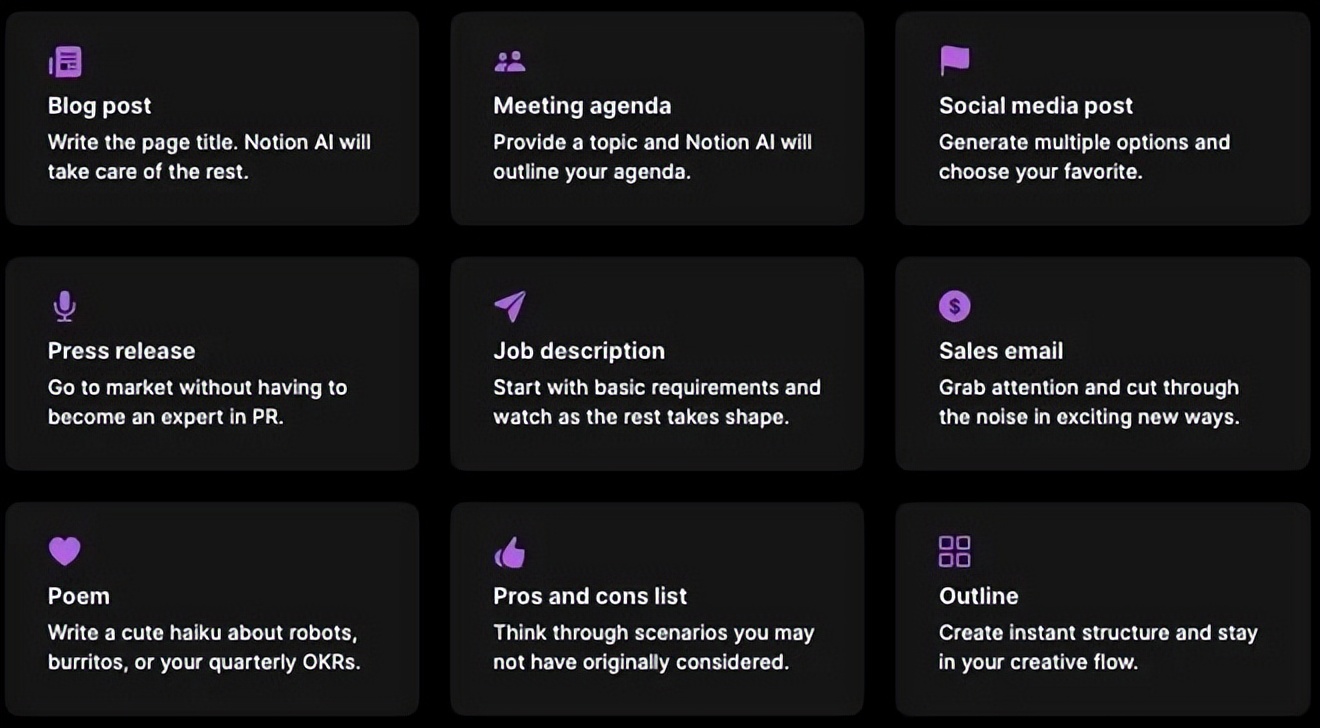
Sarah Guo: Besides Notion, which other SaaS software companies do you think will have a great impact in the AI era?
Ivan Zhao : To some extent, SaaS companies doing AI may be like a competition. Notion is mainly engaged in bundling and front office business.
This is how I define “Front office”: Let’s first assume that if we were in an office in the 1960s, what would we see? People will have a notepad on their desk to record things, and there may also be a printer. There are also many folders piled on the left and right sides. Corresponding to Notion, the notepad is equivalent to user documents and notes, and the folders are similar to Wiki. The file cabinets behind people can correspond to the relational database in Notion. There will also be various small pieces of paper in the file cabinets to help organize information.
Correspondingly, there will also be a “Back Office”, which is similar to where a librarian works. The back office corresponds to what Snowflake is doing today and what IBM was doing in the past. Notion will not touch the “back office” related parts. We will still focus on our areas of strength, which is the software interface, UI, and UX that I just mentioned.
Back office scenarios are more vertical than front office scenarios, such as focusing on the medical and health fields, specific workflows, etc., and usually require a dedicated place to store relevant information and integrate it in vertical scenarios. These scenarios are also Can be transformed by AI. In highly specialized fields such as law, large language models have begun to replace humans in handling some complex tasks.
The tasks corresponding to the front office are open-ended, while the tasks in the back office are more specific and specific, so I think there will be some kind of competition between the two, but at the same time, the market is also very large, and it is not necessarily a zero-sum game. .
Sarah Guo: You value design very much, and Notion’s design has always been praised by the outside world. Do you think Notion is a design-driven company? How do you ensure design consistency across the entire team?
Ivan Zhao : I think it depends on how we define design. At least for me, design is not just about appearance, but more importantly how a system works together. In this case, we need to make some tradeoffs. Should we choose to centralize the design or disperse it to each section? Some companies or business products are suitable for delegating design work to different sectors, especially those companies that are very operational.
The value of Notion lies in providing a unified information space and a workspace where people can focus on completing various tasks . Therefore, these functions need to work together efficiently. It’s a bit like building an operating system or a programming language. No one would divide the task of designing a programming language among 50 people. Usually the work is done by one person.
Therefore, Notion’s design is quite centralized, a bit similar to that of Apple. Apple’s way of tightly integrating software and hardware to develop an OS is rare today. In this case, in order to achieve good products and good user experience, we need to think more horizontally and comprehensively. Therefore, our design decisions are relatively focused, more in line with Apple’s style than Amazon’s.
Furthermore, I don’t think we can be limited to a certain way of thinking, because many boundaries are actually set artificially. 80% of Notion’s designers can program. They are both designers and engineers, so they can strike a good balance in design.
The essence of technology is tradeoff. A good tradeoff can motivate users to try new products and guide them to form habits. This is the core. We know more things, and we can make a better balance in design compared to other designs. For example, if designers know how to program, they will know how to adjust the design to make it easier to implement; if you can design The same is true, just like when squeezing an air bubble, find the direction that is easiest to squeeze.
So I think this diversity of capabilities helps us a lot, and everyone in Notion strives to be “all in”, which also keeps our team small but lean. Our team is small relative to the size of our business, but everyone on the team is able to maximize their abilities. We don’t have fixed roles, and we don’t need to do repetitive work. Everyone enjoys this way of working. But while there are many benefits to doing so, it’s certainly harder to find people with such abilities.
